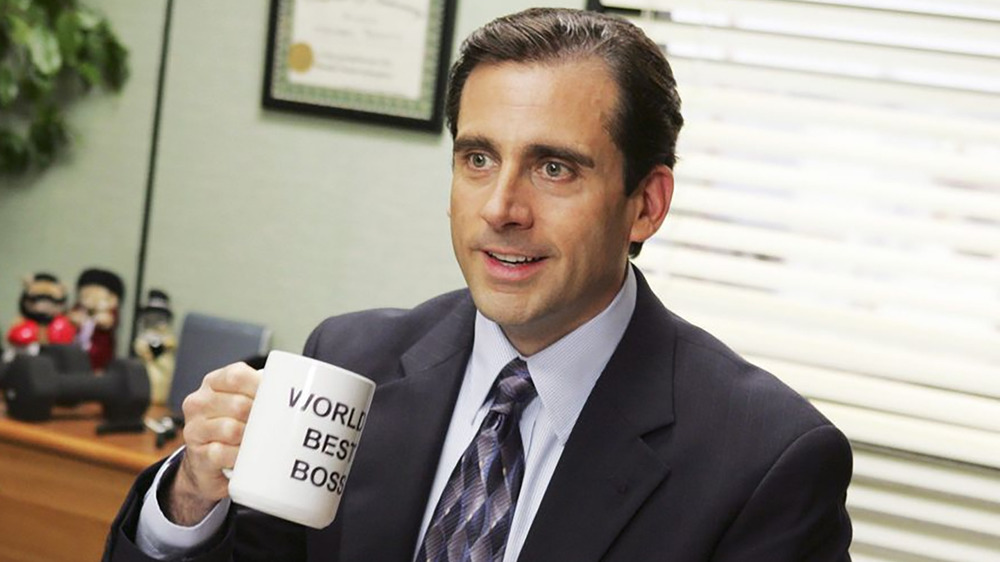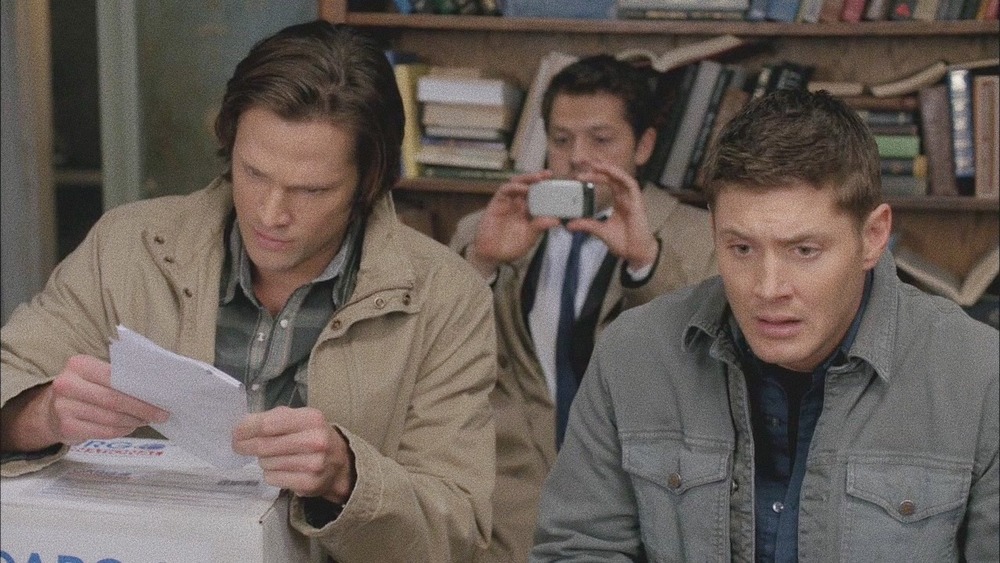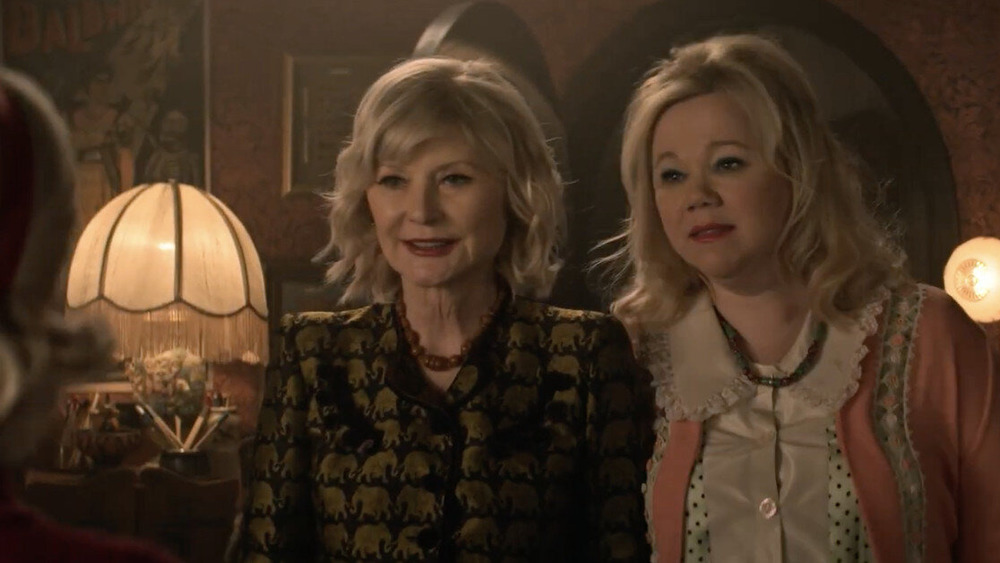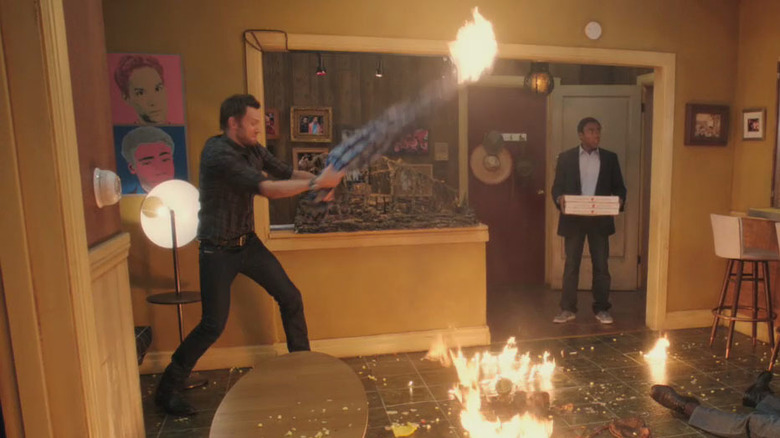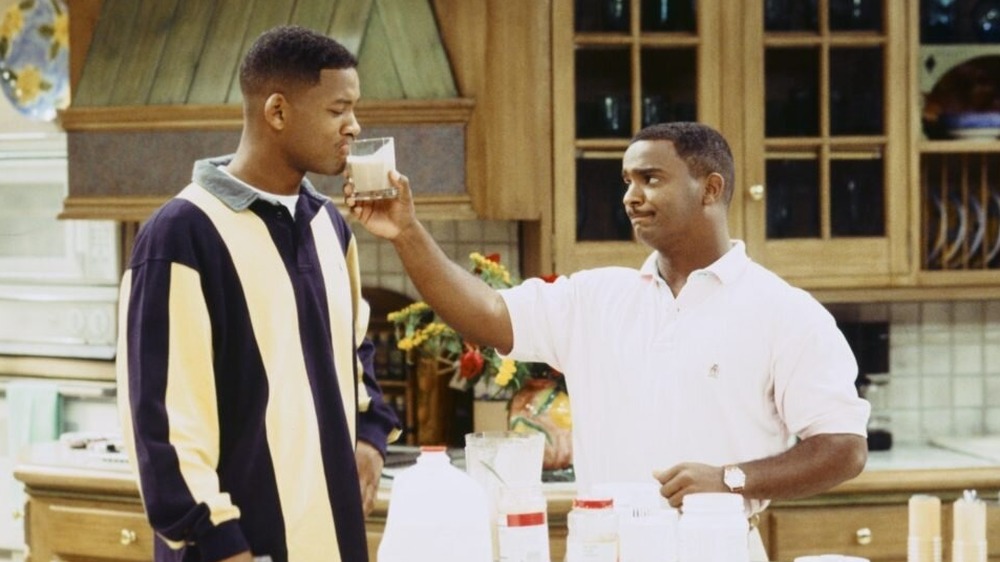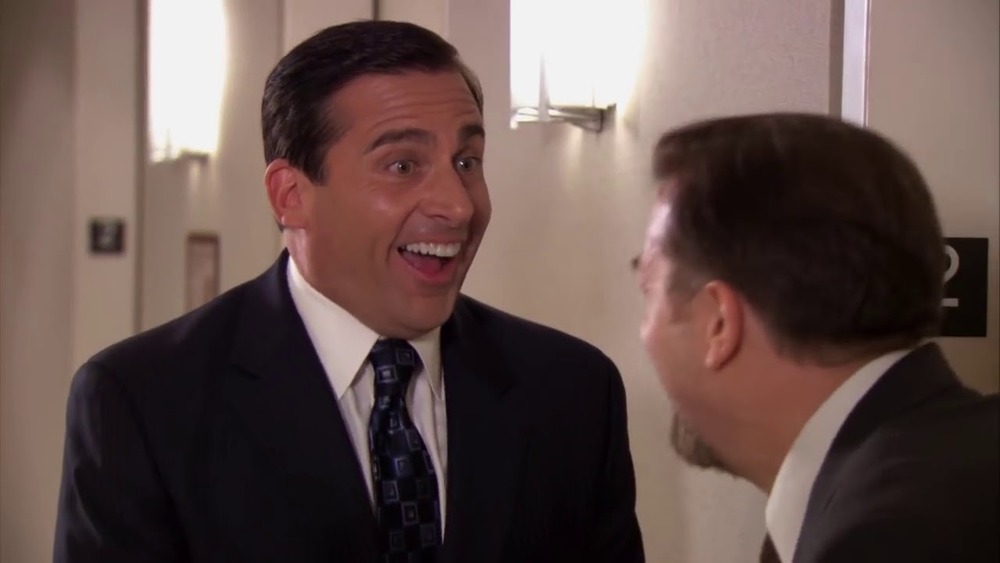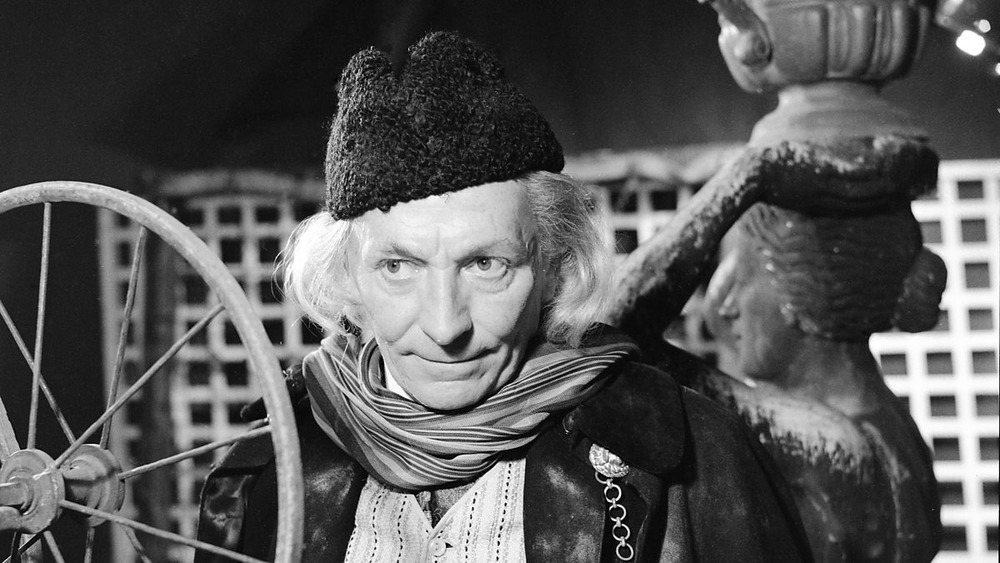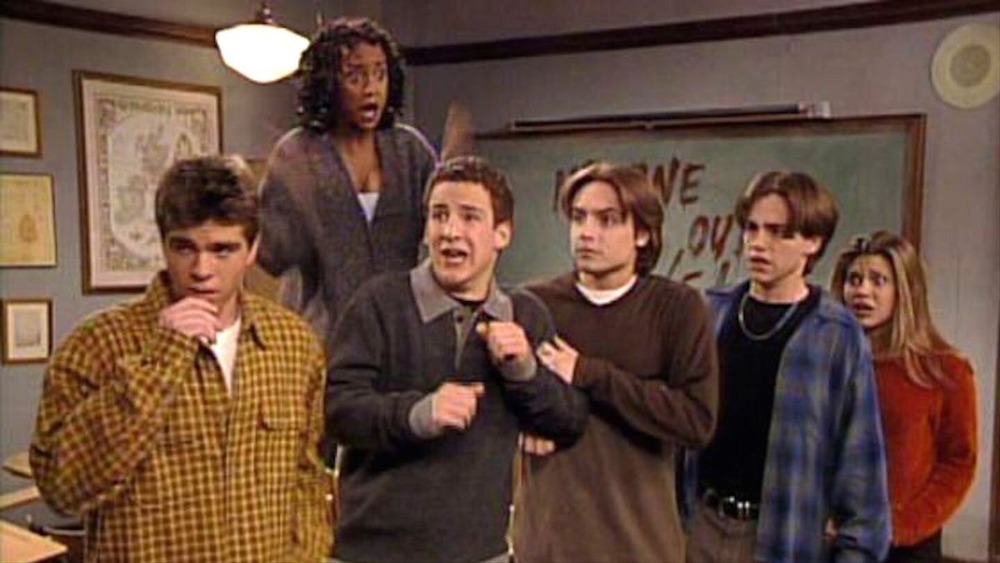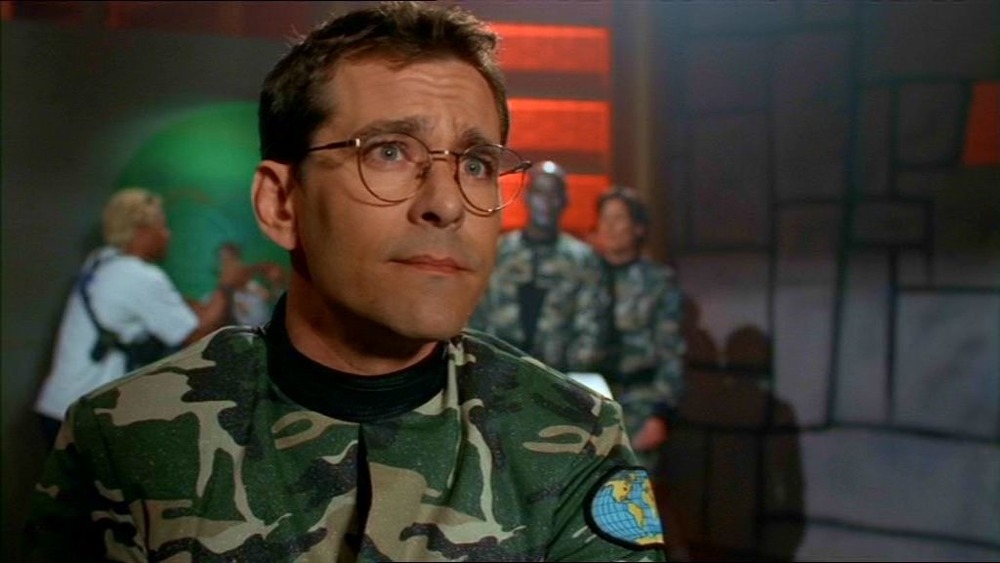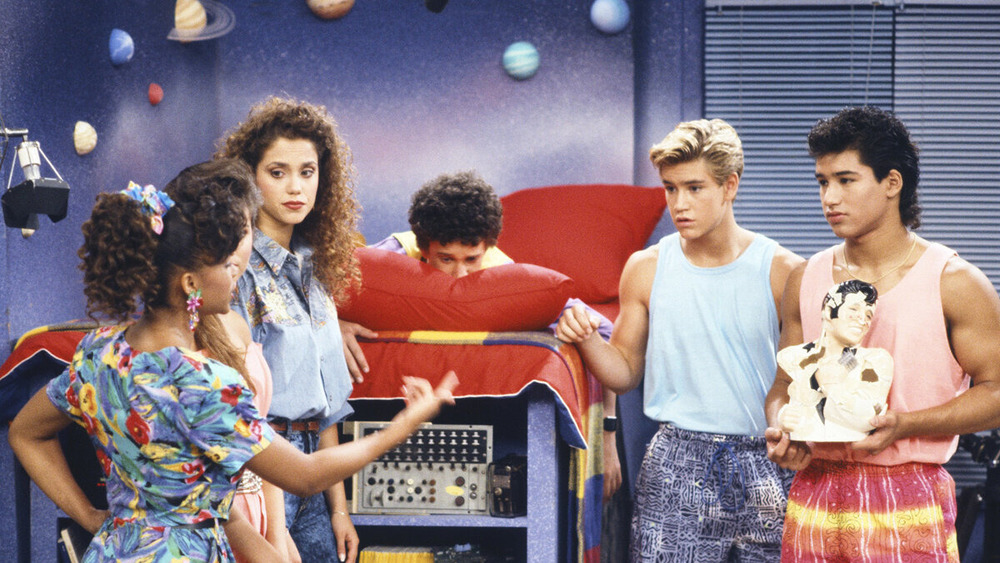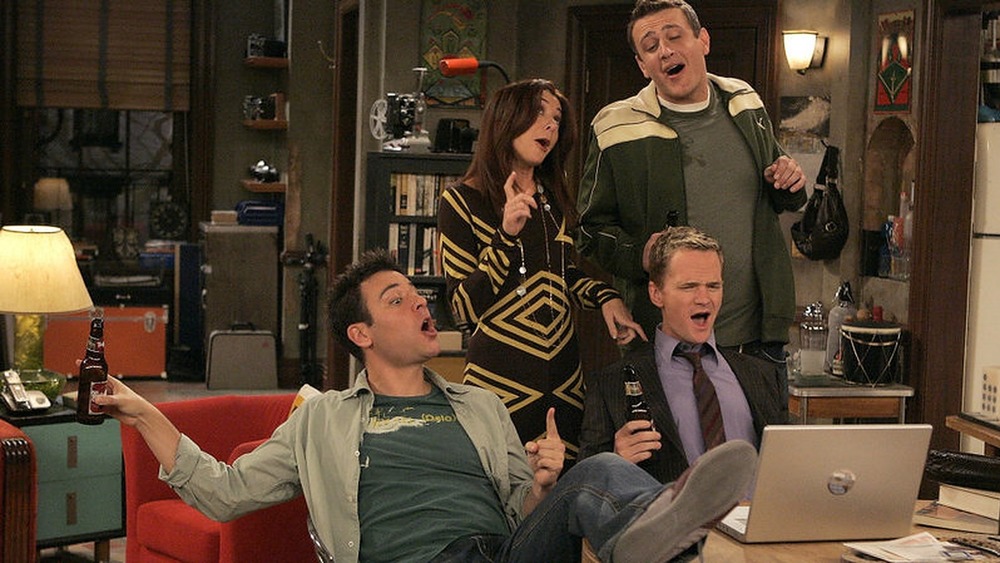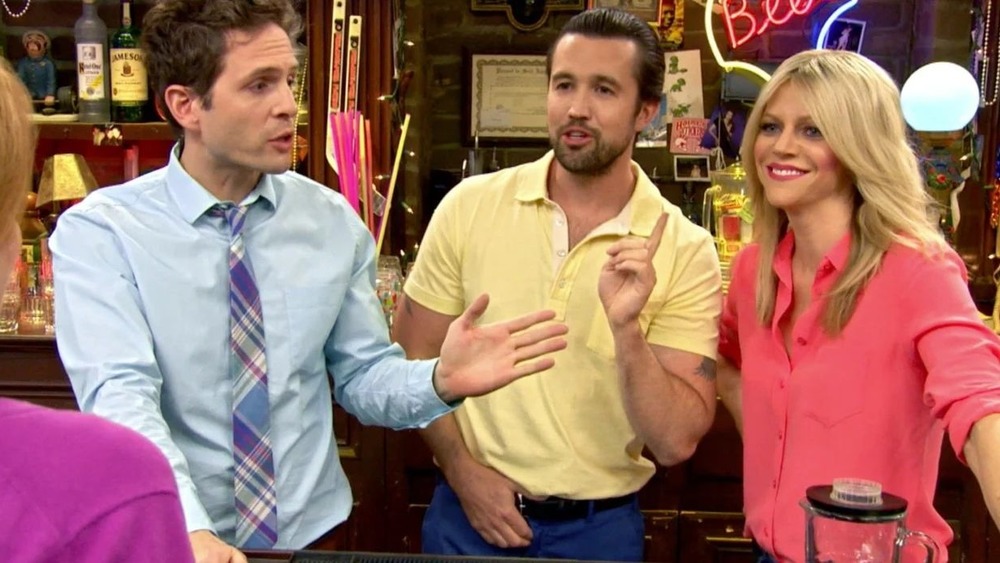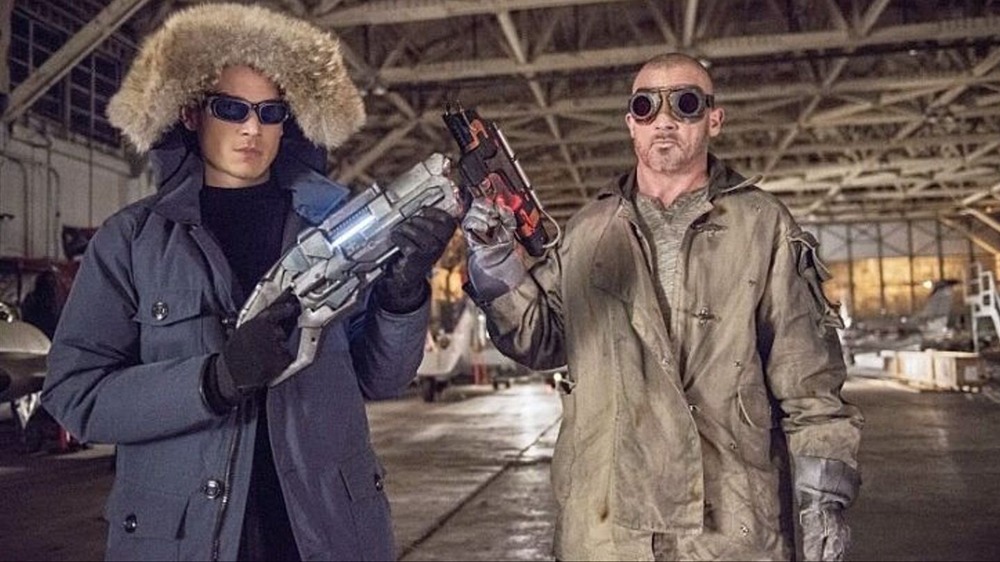The Most Meta Episodes In TV History
Everyone wants to feel like they're in on some kind of secret joke, right? So it's no surprise that TV fans can't help gravitating toward moments when their favorite characters laugh along with them. Meta episodes of beloved TV shows have thus become some of the most influential fan-favorites in history. Whenever a character speaks to the camera or becomes aware that they're on TV, they break the "fourth wall," which separates the audience and its characters. While live theater first employed the concept, examples of fourth wall-breaking are scattered throughout TV history, becoming more popular with each successive decade.
Whether it's Supernatural poking fun at filmmaking, characters like Zack Morris speaking directly to the camera, or series like Community creating multiple timelines in one episode, fans love the groundbreaking meta moments TV has to offer. We're here to take a look at some of the very best.
Why would anyone want to watch the Winchesters' lives?
Way before Supernatural introduced actual alternate universes, angels got their jollies throwing the Winchester brothers into fake realities. The season six episode, "The French Mistake," is arguably one of the best and most pointed meta episodes in TV history. It quite literally breaks the fourth wall: Angel Balthazar sends Sam (Jared Padalecki) and Dean (Jensen Ackles) smashing through a window and right onto the set of a show called Supernatural, where the actual actors proceed to play themselves.
The episode exaggerates the real actors' characteristics, though not by much: Misha Collins (Castiel) live-tweeted his TV-self's tweets in real-time as the episode aired. Easter eggs come thick and fast, like Sam and Dean watching Ackles' Days of Our Lives reel, Dean's horror at Sam marrying "Fake Ruby" (Padalecki's real-life wife, Genevieve), and the Winchesters railing on series producer Robert Singer for naming Bobby after himself. The writers clearly had fun teasing everyone involved with the show.
Supernatural makes major fun of the TV industry, personifying all executives (and creator Eric Kripke) as major jerks who only care about viewership, even when they kill off fake Misha Collins (who live-tweets his demise). Yet the bogus versions of the execs get their just desserts when the angel Virgil dramatically shoots them in a blaze of glory — a not-so-subtle homage to the end of Kripke's tenure the previous season.
The chilling adventures of Sabrina's aunts
There's no arguing that Lucy Davis (Hilda) and Miranda Otto (Zelda) did the Spellman aunties justice in Chilling Adventures of Sabrina. However, that doesn't mean fans wouldn't have given anything to see Sabrina the Teenage Witch's Caroline Rhea (Hilda) and Beth Broderick (Zelda) reprise their roles. As it turns out, fans got their wish in the Netflix series' final season — just not in the way they expected.
"The Endless" follows Sabrina Morningstar into an alternate universe, where she's acting in a show about her life. Any slip-ups of her lines have dire consequences. What's more, the OG actors from Melissa Joan Hart's series replace her beloved aunts — and the new ones are not all they seem. Neither is Salem, for that matter, who moonlights as the fake series' showrunner, and turns misbehaving actors into kitty food in the mysterious Green Room. Green rooms are supposed to be happy places, Salem, get with the program. CAOS also honors the original Salem's puppet look through the clever use of CGI.
A community of chaos (and alternate timelines)
Few shows have gone meta more often than Community, but that's just what happens when a main character is a film buff with a flimsy grip on reality. The mind-bending season three episode, "Remedial Chaos Theory," follows the study group as they throw a housewarming party. It dissolves into chaos when they are forced to decide who will grab the pizza. Jeff suggests they roll dice, creating six alternate timelines (and pizza-getters) in the process.
After a slew of alternate timelines play out, Abed stops Jeff from rolling the dice. He laments, "Chaos already dominates enough of our lives. The universe is an endless raging sea of randomness." Abed concludes that the group will always be okay if they accept each other's flaws and virtues. Yet, the end of the episode reveals that the alternate timelines might not be in Abed's head after all. When Jeff rolls a one earlier in the episode, the "Darkest Timeline" is born: Pierce dies from a bullet wound, Annie gets locked in a psych hospital, Shirley becomes an alcoholic, Jeff loses an arm in the fire, and Troy loses his larynx when he tries to destroy a flaming troll doll by eating it. Evil Abed suggests they commit to being evil, devising a plan to return to the prime timeline to destroy the good versions of themselves and take back their old lives. Later in the series, they almost succeed. Dun dun dun!
Xander knows he's a tropey lackey in Buffy the Vampire Slayer
Buffy the Vampire Slayer doesn't go meta too often, but the season three episode, "The Zeppo," breaks the fourth wall from a unique perspective. This episode examines Xander's status as the show's goofy sidekick, primarily telling the events from his perspective. Yet even when an episode is about Xander, he's still forgotten.
After almost dying during a slaying, Buffy and company try to keep Xander out of harm's way when yet another apocalypse threatens to open the Hellmouth. Always ready to pick at people's insecurities, Cordelia says, "You're like this little nothing. You must feel like Jimmy Olsen." Referencing the lesser-known youngest Marx Brother, Cordy sets the episode's tone, calling Xander the "Zeppo."
Xander tries to up his cool status with a classic car. He then hangs out with a gang of zombies, stops them from blowing up the school, and loses his virginity to Faith. While they're hooking up, the camera pans to their reflection in the TV — a subtle nod to the self-aware aspects of the episode. Xander does all this without his friends' help, yet unlike most characters who get a taste of glory, he much prefers going on donut runs to thrilling heroics. Thus, he keeps the events of the episode to himself and accepts his role as the dependable human with no superpowers.
Carlton flees into the audience
As it turns out, when you prank a prankster, things get complicated. The Fresh Prince of Bel-Air is no stranger to breaking the fourth wall, but the season five episode, "Will's Misery," takes things to the next level — and then hops the fence and goes even further. Will's status as a ladies' man is no secret, nor is his cousin Carlton's resentment of him because of it. So when Will makes a play on Lisa, the new Kappa sorority pledge, Carlton takes the opportunity to teach Will a lesson ... by having her tie him up in a secluded cabin, and forcing him to apologize to the sorority. But, of course, smooth-talking Will gets the truth out of Lisa, and decides to play along.
Never one to give up the opportunity to prank, Will tells Carlton that Lisa went crazy and tied him to a chair when they got up to the cabin, forcing him to hit her with a rock in self-defense. After implying that he killed her, Will cries, "Oh my god, she's still up there!" Carlton freaks out, running all over the set. He books it through the house, outside, into the cabin, through the live studio audience, and past the sorority sign-up set. He ends the run-through by hugging Will, who's in the back with the crew. Subtle? No. Hilarious? Yes.
Two managers walk out of The Office
The Office has some of the best cold opens in TV history, but for fans of the original BBC series, the one from "The Seminar" takes the cake. While the two iterations of The Office feature different employees, the premise is the same: They both chronicle a small paper company branch run by a goofy, unproductive boss prone to borderline-offensive antics. The British boss, David Brent, and his American counterpart, Michael Scott, get their very own meet-cute moment outside of an elevator in "The Seminar." It took seven seasons to put Ricky Gervais (David) in the same room as Steve Carell (Michael), but boy, was it worth it.
Unsurprisingly, the two bosses hit it off, bonding over accents (and how pretending to be various ethnicities couldn't possibly be offensive). David notes, "Comedy is a place where the mind goes to tickle itself," quickly adding Michael's patented "that's what she said" innuendo. They hug, and David asks if there are any jobs available. Sadly, there aren't, but Michael still walks away from the encounter glowing with camaraderie.
David shows up in the US series once more in a video application when Dunder Mifflin is looking for a new manager. For those in the know, these appearances are a delightfully meta nod to the short lived and much-beloved original show.
Nothing gets by the Doctor
Older TV shows often get left out of the meta conversation. This makes sense — these sorts of jokes were rarer back then. But breaking the fourth wall wasn't entirely unheard of on TV back in the '60s. Fans of classic Doctor Who might remember a 1965 episode of the series entitled "The Feast of Steven," which serves as one of the series' oldest Christmas specials.
So what makes the episode so iconic? The first Doctor, played by the late William Hartnell, wishes fans a happy Christmas directly to the camera. He says, "Oh, and incidentally, a happy Christmas to all of you at home." This was pretty groundbreaking at the time, as it happened before the trope became wildly popular with films like Annie Hall. Even today, the moment stands out. Hartnell is directly addressing viewers in a way that can't be explained in the episode: He's essentially saying, "Hey guys! I know I'm a character in a TV show!" This sort of nod is rarely the case in meta TV — usually, writers find a way to be a bit subtler. But hey, we love a self-aware Doctor.
Boy meets slasher flick
Most sitcoms have their fair share of Halloween episodes. Yet popular '90s teen show Boy Meets World takes the concept 10 steps further, turning season five episode, "And Then There Was Shawn," into a horrific parody of slasher flicks where almost everyone dies. The episode pulls tropes from movies like Scream and I Know What You Did Last Summer, even bringing in Jennifer Love Hewitt to make out with Eric. She promptly dies before she can name the killer, obviously.
Of course, the episode occurs in detention when Mr. Feeny leaves our favorite high school slackers (and Topanga) to be tormented by a creepy janitor, a threatening message on the wall, and the death of every suspect as soon as they're suspected. Shawn plays the role of "knowledgeable horror buff," explaining the tropes much like Randy Meeks in Scream. But it is, of course, all just Shawn's dream while he works through his feelings about Cory and Topanga's breakup. A bit dramatic, Shawny, don't ya think?
Wormhole X-treme-ly unsubtle
TV shows really love to go super meta during season five for some reason, and Stargate SG-1 is no exception. The sci-fi series goes the self-parody route, debuting a show within the show that's about ... the show. The fake series is titled "Wormhole X-Treme," unsubtly based on the supposedly secret Stargate program.
While fans expected the show's Air Force to squash the pilot episode of the fake series, they deem it more useful to let the show continue, offering the perfect cover story for their program. Because surely if there were a program like Stargate, they wouldn't allow a show to get made about it, right? Thus, the perfect cover for their secret shenanigans is born.
Anyone suspicious about the show being based in reality would have a field day over the fact that Colonel Jack takes on the role of Air Force technical advisor to check out the set and confront the information leak. That's a totally normal thing the Air Force would spend time doing, if they weren't carrying out covert space missions themselves. Fans even get an in-episode segment called "The Making of Wormhole X-Treme!," in which the fake cast gives interviews and behind-the-scenes exclusives.
Saved By the Bell, or saved by self indulgence?
Some shows decide to dedicate an episode or two to a meta idea, but Saved By the Bell goes the extra mile, writing the concept into the series' DNA. The premise even set the tone for other meta sitcoms, like The Fresh Prince of Bel-Air.
It's only fitting that Zack Morris, the show's' self-centered lead, would have a quirk that's, well, pretty self indulgent. Anytime the prankster finds himself in a troubling situation that he needs to think through, he yells, "time-out!," causing everyone around him to freeze. Then, he looks at the camera and muses out loud about what he should do. All the while, time waits for him.
Unfortunately, real life doesn't work like that, but it is a perfect character choice for a spoiled rich kid from LA. And hey, who wouldn't need some extra time to think through their life choices if they were regularly getting their best friends addicted to caffeine pills and selling calendars of their half-naked female friends without their consent?
How I met your obnoxious father
Ted Mosby thinks he's something of a genius, but most of the time, he's just an insufferable know-it-all who does not, in fact, know it all. In How I Met Your Mother's seventh season episode, "Mystery vs. History," Ted is scandalized to hear that his latest date gave Annie Hall a lousy review. (No worries that she also enjoys dogfighting — clearly, her movie choices are a more pressing matter for Ted.)
Misplacing his anger as usual, Ted lectures Robin and Barney about the importance of Woody Allen's invention of breaking the fourth wall. He has his facts off by just about 82 years, though. People often credit Allen as the technique's inventor, but if you look hard enough, you can find examples of the practice scattered through the very first films ever made. Way back in 1895, a character in the Lumière brothers' film, The Photographical Congress Arrives in Lyon, tips his hat to the camera, launching the trope. Unimpressed with Ted's incorrect history lesson, Robin looks straight into the camera and says, "Can you believe this guy?" while cheeky music plays in the background.
It's never sunny during awards season
It's Always Sunny in Philadelphia is groundbreaking in a lot of ways, but you'd be hard-pressed to find the series adequately represented during awards season. The actors are very aware of this fact — and more than willing to parody it for entertainment.
It all goes down in season nine's "The Gang Tries Desperately to Win an Award." When Frank lets the gang know that the Restaurant Bar Association's Best Bar Award is on the horizon, Mac is quick to dismiss him, saying, "Frank, we never get nominated for awards, okay?" Of course, they spend the next 20-plus minutes desperately trying to mimic a trendy local bar to win an award they absolutely, totally, 100 percent do not care about.
Utilizing tactics that reference well-known tropes from film and TV, the gang tries fake flirting, sexual tension, a love triangle, popular music, and ridiculous lighting. Obviously, they only manage to aggressively threaten and freak out the industry people attending their disturbing event. And like most events at Paddy's Pub, the evening ends with Charlie singing about spiders and spitting on customers. But they didn't care about the award anyway. Really!
Prison Break today, Legends of Tomorrow
When the CW announced Dominic Purcell and Wentworth Miller as guest stars on The Flash, fans of the long-canceled Fox series Prison Break couldn't contain their excitement. But what started as guest stints on the superhero series became full-fledged series regular roles when the CW greenlit the time travel spinoff, Legends of Tomorrow.
In Prison Break, Purcell played Lincoln Burrows, an innocent convict on death row, while Miller portrayed Michael Scofield, his brilliant brother, tasked with breaking Linc out of prison. As the title would suggest, they break out of prison — a lot. Naturally, Legends of Tomorrow's writers created an entire episode teasing the actors' previous show.
In the episode, Captain Cold (Miller) has to break out Heat Wave (Purcell) from prison. Rip Hunter, captain of the team, notes, "I doubt that it's [Heat Wave's] first time in prison, or second, or, I imagine, tenth." Uh ... he'd be right about that one. Even more on the nose, Captain Cold is entirely unimpressed with Rip's summary of the plan, adding, "This isn't my first prison break." Indeed, it's not. The episode gives Prison Break fans a delightful blast from the past, and satiated them until Purcell and Miller reprised their roles in a 2017 Prison Break revival series.
